Protests in Bangladesh that involved many students have led to the long-time prime minister fleeing the country.
The developments in the South Asian country are among the most recent incidents in which students and other young people played an important part. They have brought down governments or forced them to change policies. Recently, the Associated Press (AP) listed some historic protests:
Bangladesh
In Bangladesh, weeks of protests against a system that set aside government jobs for the families of veterans with ruling party ties forced the prime minister from office.
The demonstrations against the quotas for government jobs began peacefully last month. Students are said to have led the protests against the system for government jobs. They said it unfairly favored those with ties to the ruling party.
On July 15, student protesters fought with security officials and pro-government activists. Former Prime Minister Sheikh Hasina fled last week after the unrest. It is estimated that nearly 300 people died in the violence including students and police officers.
Gota Go Gama protests in Sri Lanka
As in Bangladesh, young people took part in widespread protests in Sri Lanka in 2022. The protesters blamed President Gotabaya Rajapaksa for the economic collapse of the country and corruption.
In April 2022, university students and other young people occupied an area next to the president's office in the capital Colombo. They demanded that the president and his government resign. They called the camp "Gota Go Gama," or "Gota Go Village," a play on Gotabaya's nickname "Gota."
The protest area grew. Gotabaya Rajapaksa held onto power until July, when protesters stormed his official residence. He fled the country and later resigned.
Athens Polytechnic uprising in Greece
In November 1973, students at Athens Polytechnic university rose up against the military dictatorship that ruled Greece for more than six years.
Student protests began peacefully with a strike on November 14 of that year. The students stopped attending classes and occupied the campus at the university in Athens. By the next day, thousands from around Athens had joined to support the students and the demonstrations grew. People called for an end to the dictatorship.
On November 17, the military attacked the protestors, killing many students and injuring more than 1,100. After a series of events, Greece, the birthplace of democracy, returned to that form of government in 1974.
Kent State demonstrations in the United States
President Richard Nixon approved attacks on neutral Cambodia in April 1970. That policy was an attempt to close enemy supply lines, but it expanded the conflict. American students had already been protesting the U.S. involvement in Vietnam for years.
On May 4, hundreds of students at Ohio's Kent State University gathered to protest the bombing of Cambodia. Officials called in the Ohio National Guard to break up the protest.
The National Guard used tear gas as they moved forward. For reasons that are still not clear, some National Guard members opened fire on the crowd. Four students were killed, and nine others wounded.
The deaths were a defining moment for a nation divided over the long war, in which more than 58,000 Americans died.
One result was a strike by an estimated 4 million students across the U.S. About 900 colleges and universities closed temporarily. Historians argue that the events helped turn public opinion against the conflict in Southeast Asia.
Soweto Uprising in South Africa
In the struggle against white minority rule in South Africa, an important moment came in 1976 in the Soweto area of Johannesburg.
On June 16, Black students began to protest against being forced to study in Afrikaans, the language of the country’s white rulers. The country was ruled under a system of racial separation called apartheid.
People in other areas of South Africa joined protests to express opposition to apartheid. The government’s effort to control the uprising led to deaths estimated to be in the hundreds.
Worldwide attention and support for the protesters brought the end of apartheid years later. South Africa held democratic elections in 1994.
Velvet Revolution in Czechoslovakia
In 1989, the Communist governments of Eastern Europe were beginning to fail. After riot police suppressed a student protest in Prague on November 17, widespread demonstrations against the Communist rulers started in what was then known as Czechoslovakia.
On November 20, many others joined the students and an estimated 500,000 took to the streets of Prague.
Because the protests were non-violent, they were called the "Velvet Revolution." They led to the resignation of the Communist Party's leadership on November 28.
By December 10, Czechoslovakia had a new government. On December 29, parliament elected the writer Vaclav Havel, who had spent several years in prison. In 1992, Czechoslovakia peacefully split into two countries, the Czech Republic and Slovakia.
I’m Mario Ritter, Jr.
And I’m Jill Robbins.
David Rising reported this story for the Associated Press. Jill Robbins adapted it for Learning English.
______________________________________
Words in This Story
quota –n. an official limit or number of people who are permitted in a program or similar system
nickname –n. a name that is not someone’s official name, but which people use for them
campus –n. the grounds of a school, business or organization
What do you think of this story? Write to us in the Comments Section.



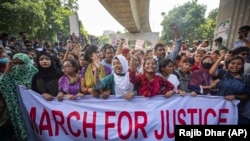


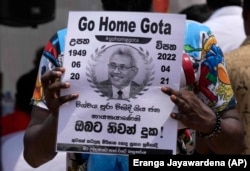
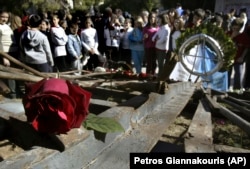
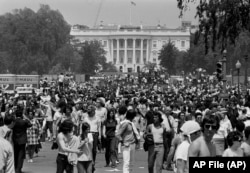
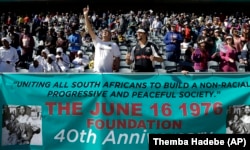
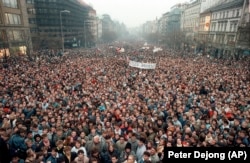
Forum